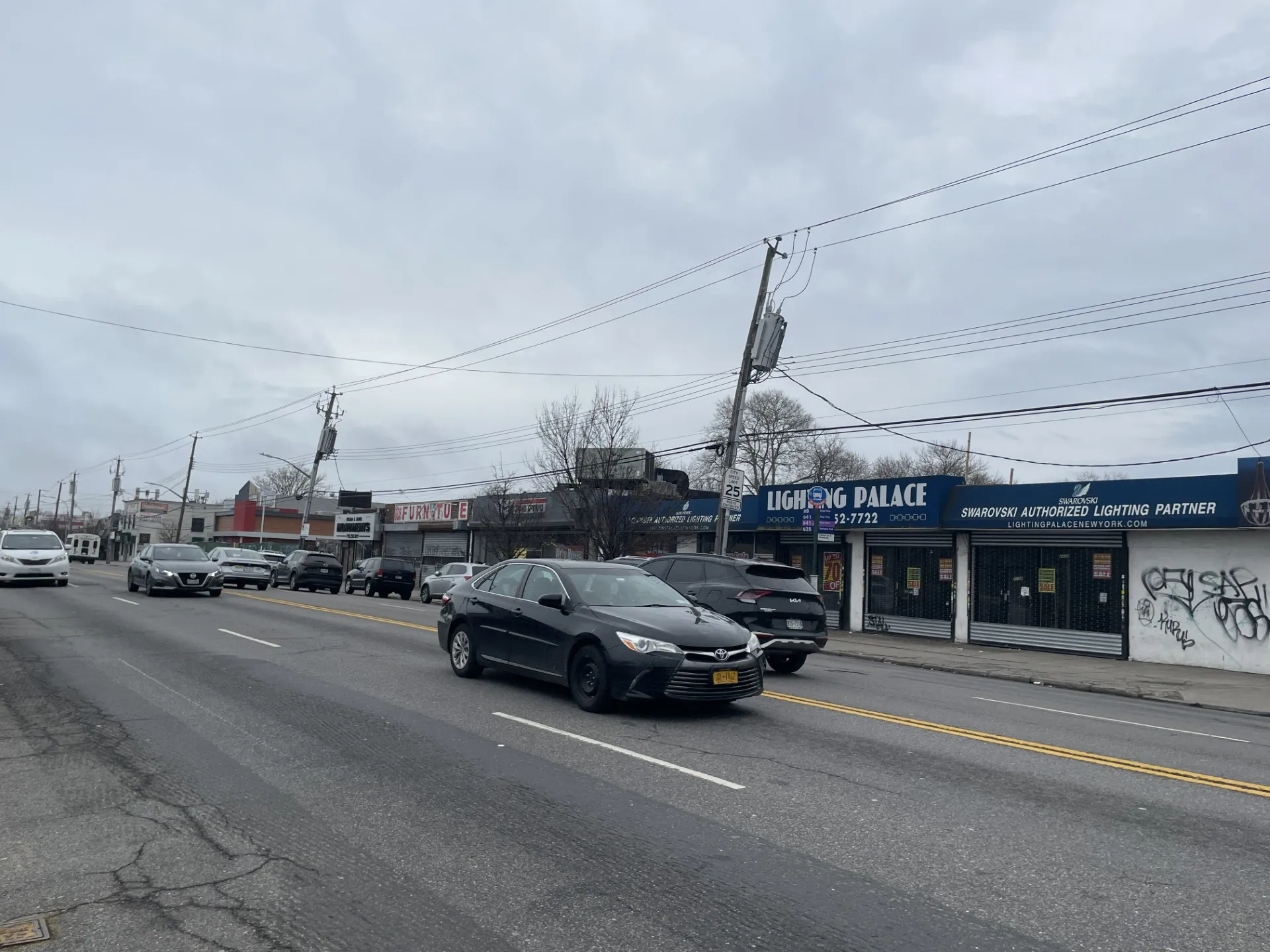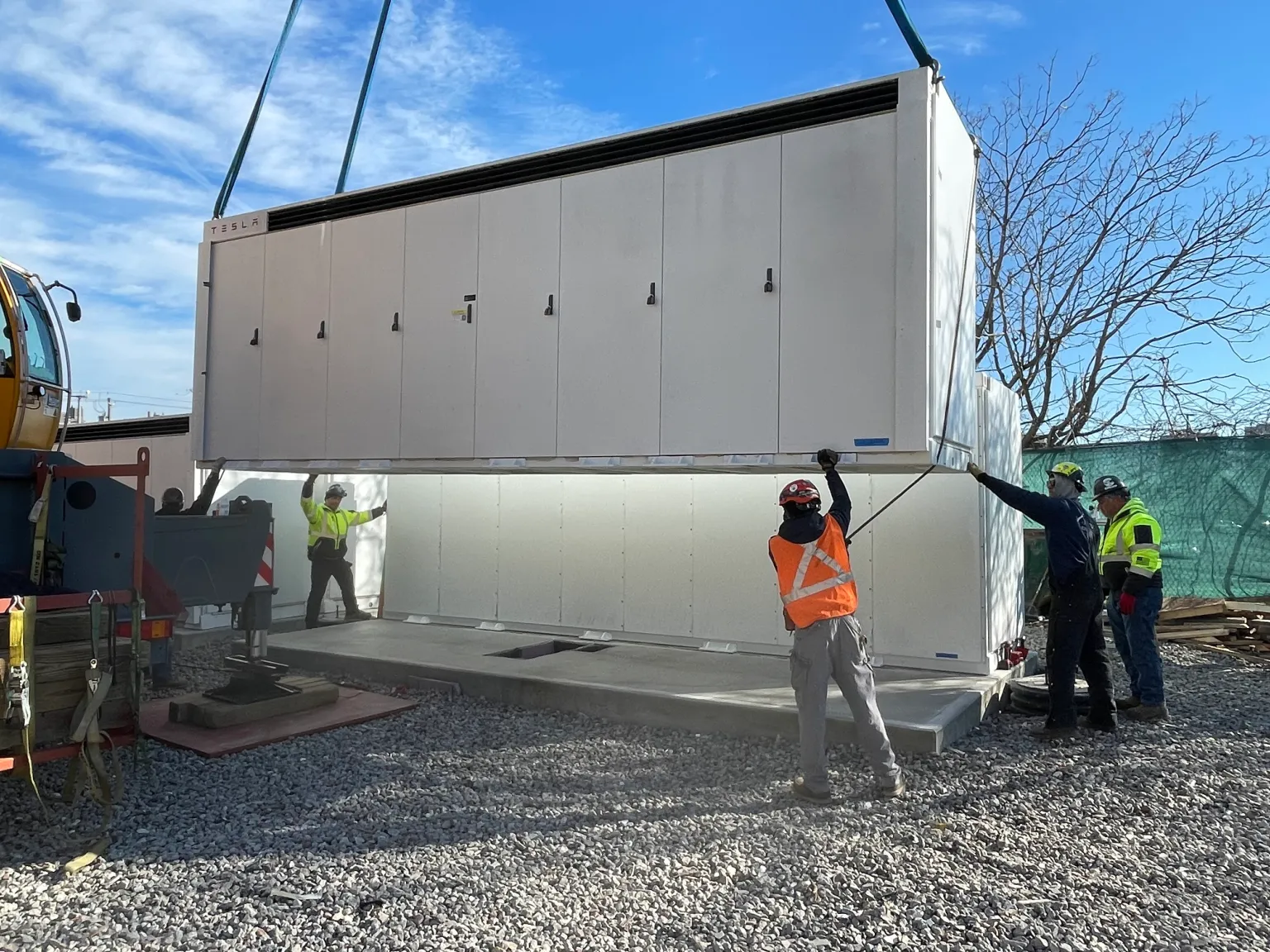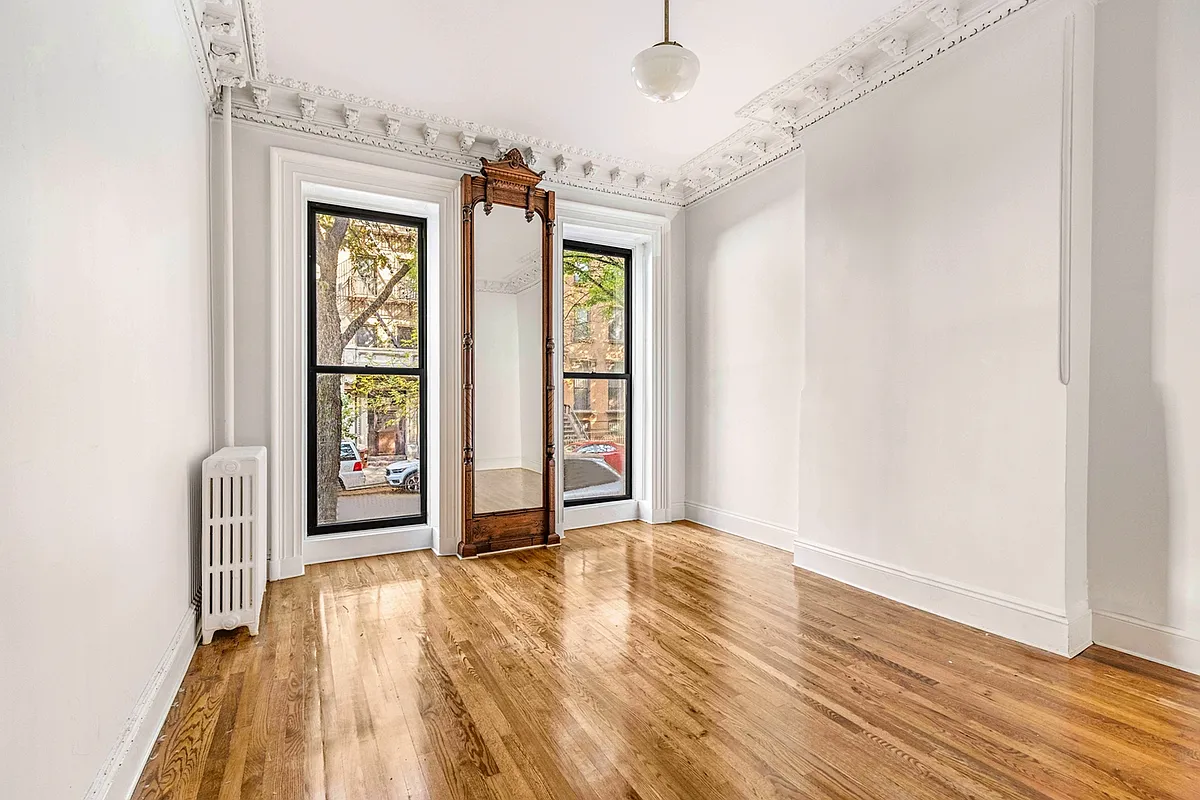Marine Park Locals Skeptical of Battery Storage Facility Safety
A draft Assembly bill would create a bond for healthcare costs as battery storage facilities spread in Brooklyn and Staten Island.

Marine Park residents fear the facility poses a fire hazard and potential health risks. Photo by Megan McGibney
By Megan McGibney, Brooklyn Paper
Marine Park residents are outraged over plans to build a lithium-ion battery energy storage system near their homes, concerned about the project’s location and safety risks it could pose to the neighborhood.
Their frustration boiled over at a March 6 town hall hosted by Community Board 18, where a nearly three-hour meeting was marked by shouting, heckling, and fears over potential risks. The facility is set to be built at 2138-52 Flatbush Avenue, between a pizzeria and a cemetery monument business, on the site of a former lighting store. A row of residential homes sit just feet from the back of the property.
“This is going to be on a huge property and the value of everyone else’s will plummet,” said Jerry Camarda, the owner of Frank’s Pizza and Restaurant. “Who knows what’s going to happen healthwise, like radiation? What if the batteries leak?”
Tommy Mui, a 20-year Marine Park resident who lives behind the site, called the facility a fire hazard.
“Why did they decide to put it here?” he asked. “This is residential.”

Enter NineDot Energy
The company behind the Marine Park project is NineDot Energy, a clean energy firm founded in 2015 and based at the NYU Urban Future Lab at the NYU Tandon School of Engineering in Downtown Brooklyn. Co-founder Adam Cohen said the company aims to expand energy storage and clean energy solutions across the city, aligning with New York State’s efforts to decarbonize and transition to renewable power sources.
“New York City has a really dirty power grid,” Cohen told Brooklyn Paper. “And the state has been trying to figure out ways to clean up the entire system. There’s been plans to bring in lots of solar and lots of wind out of New York, and then lots of storage in the city and out of the city, to kind of clean up our grid from this really dirty, 90% fossil fuel-based power grid to the plan to have a zero emissions grid by 2040. So there’s kind of this pathway for the next 15 years to go from where we are now with this dirty, expensive power grid [in] New York City to this clean grid and less expensive grid.”
Lithium-ion battery storage systems like the one planned for Marine Park store energy generated by renewable sources like solar and wind and discharge it during periods of high energy demand — like on particularly hot summer days — to help stabilize the system. The batteries charge quickly, making them a potential fit for densely populated areas like New York City, and are meant to reduce the use of highly-polluting peaker plants.
NineDot Energy is developing similar community-scale energy projects across the city, including in Brooklyn, the Bronx, Queens, and Staten Island, but not Manhattan, where space is more limited. One of its first projects launched in August 2022 in the northeast Bronx, near a charter school.
According to Cohen, the approval process involves multiple city agencies, including the Department of Buildings and the New York City Fire Department, which enforces strict safety standards. The utility company Con Edison also plays a role by connecting battery storage facilities to the power grid.

Sparking backlash
The Marine Park site is the latest NineDot Energy project to spark community backlash. A similar battery storage facility planned for Staten Island has also drawn opposition, with a Change.org petition garnering more than 1,600 signatures as of March 21. In late 2023, elected officials spoke out against another NineDot site in the borough.
NineDot is also not the only clean energy firm seeking to build battery energy storage. Soltage is looking to build one in Gravesend — also next to a residential area.
Safety concerns remain a common thread across those projects. Many New Yorkers associate lithium-ion batteries with e-bikes, which caused 270 fires in 2024.
But Cohen insisted there is a key difference. While both use lithium-ion technology, he says e-bike batteries lack certification and oversight, whereas battery energy storage systems (BESS) are regulated and designed to meet strict safety standards.
“The batteries that we use are highly certified,” he said. “They go through a certification process.”
The batteries NineDot uses, supplied by Tesla, undergo rigorous certification and testing before installation, according to Cohen. In New York City, the FDNY conducts its own review, applying what is considered a global gold standard for safety. Beyond that, the DOB performs an additional assessment to ensure compliance with city regulations.
Cohen added that lithium-ion batteries are commonly used in iPhones, laptops and other electronic devices.
Still, concerns remain about the risk of fire — a key issue raised by Marine Park residents at the town hall. Many pointed to a January fire at a battery storage facility in Monterey County, California, which burned for several days. According to a recent New York Times report, residents there have since reported feeling ill and fear exposure to toxic chemicals.
Another lithium-ion battery fire in Warwick, New York reportedly left the air “smelling like glue” in June 2023.

Sam Brill, NineDot’s vice president of strategic development, told attendees at the March 6 meeting that California’s safety standards differ from those in New York. He also noted that the Moss Landing facility was the largest battery storage site in the world — something the Marine Park project will not be.
“That system was about 750 megawatts,” Brill said. “That was football fields and football fields full of batteries inside of a building. We are talking about projects that are 14 megawatts, right? So, every single fire you just mentioned used technology which the fire department would not allow in New York City. I just want to make that really clear. I understand folks don’t trust me. I hope you do trust the fire department. I hope you do trust the Department of Buildings.”
Residents appeared unconvinced. Amid collective groans and murmers, one person exclaimed that Marine Park could “look like Chernobyl” if there were ever a disaster at the site.
FDNY officials pushed back on those claims.
Captain Matt Quinn and Chief of Fire Prevention Thomas Currao outlined the FDNY’s oversight and the fire prevention measures in place for the battery storage facility. They said the site would include a sprinkler system, fire alarm, and other safety measures. When asked if water would be used to fight a fire, Currao confirmed that it would.
“Water can extinguish these fires,” he said. “But we know that with the technology in general, the most important thing, from our perspective, is to make sure that if it is burning, that it does not go anywhere else. That’s why all these sites are equipped with sprinkling mechanisms and that’s what we’re gonna do.”
Still, many residents remained skeptical.
“Of course they’ll tell us that. And if a big fire broke out, then what? And will there be radiation?” said Nina Davidova of NY Wholesale Monuments, a family-owned cemetery monument business next to the proposed site. “Nothing is guaranteed in reality.”
Mui also has doubts. “I don’t think water can be enough,” he said. “Water doesn’t drown out chemicals. You’d think they know better than that.”
According to the federal Occupational Safety and Health Administration, lithium-ion batteries are made with various lithium oxides that can include cobalt, nickel, manganese, and aluminum — and often contain materials like graphite, titanium dioxide, and solvents like dimethyl carbonate and ethylene carbonate.
During normal operations at the proposed battery storage plant, residents would not be in contact with those chemicals.
Still, after the battery storage plant fire in California last year, preliminary testing found heavy metals associated with the batteries in soil and drinking water around the plant. Some samples showed higher-than-safe heavy metal contamination, according to the New York Times, and long-term exposure to those metals can cause significant health risks.
In addition to safety concerns, residents Brooklyn Paper spoke to voiced fears about the impact on their property values. NY Wholesale Monuments, which is connected to the former lighting retail business sold to NineDot in February 2024, and Camarda, owner of Frank’s, both said they were unaware of the sale or the planned installation of a battery energy storage system until early this year. Now, they are left wondering what will become of their businesses.
“Why not buy me out, too?” Davidova asked. “Maybe people will not come here because of those batteries. It was not our plan to sell.”
“If people start selling their houses, who’ll buy them?” added Camarda. “People regularly walk by here at night and those batteries will be charging. And would anyone want to eat here?”
One neighbor said he is already moving. A man named William, who declined to give his last name, said he was grateful to be moving out of his home before the facility opens.
“I put it up for sale before any of this,” he told Brooklyn Paper. “I’m definitely lucky. Other people will have a harder time if this thing happens. I hope the Community Board keeps up the fight.”
Residents also criticized the company for choosing to build in a busy area. Situated on bustling, four-lane Flatbush Avenue, the site is surrounded by homes and businesses.
Cohen explained that the location was selected because it would be easier to connect to the power grid. Alternative sites, such as Floyd Bennett Field, were suggested during the town hall, but NineDot noted that it is located in a flood zone.
Camarda hopes that lawsuits will be filed against NineDot, though he acknowledges it will be difficult for residents to challenge a large corporation. He also expressed hope that politicians will step in to address the issue.
Assembly Member Jaime Williams and City Council Member Mercedes Narcisse were both at the town hall, and have both criticized the project.
‘Our community should not be an afterthought’
“Our community should not be an afterthought in this process,” Narcisse said in a statement. “Moving forward with this facility in a residential area without meaningful community input is poor governance. Residents rightfully have serious concerns about safety, and there has been little clarity on what protocols have been incorporated into fire codes to protect nearby homes and businesses. These critical discussions should have taken place before any proposal was set in motion or permits were granted.”
Since the project didn’t require approval from the City Council or Community Board, Narcisse said transparency at this stage is even more important.
“While this project aligns with broader government goals under the NYS Climate Leadership and Community Protection Act of 2019, it is unacceptable for decisions of this magnitude to be made without proper engagement with the people who will be directly impacted,” she said.
Williams said the Assembly’s Standing Committee on Energy is drafting legislation in response to the growing number of battery storage facilities around the city. She said the proposed bill would require that such facilities be located at least 200 feet from homes and include a billion-dollar bond to address potential health issues faced by homeowners.
When asked about the lack of communication between NineDot and the community before purchasing the Marine Park site, NineDot spokesperson Karen Alter pointed out that both the company and the FDNY have been publicly discussing the safety of BESS facilities for the past few years.
“You can tell it, but people have to decide they want to listen to it,” Alter said. “There’s no hiding about this. We have been very, very clear about the safety of these batteries. We wouldn’t build them if they weren’t safe.”
Following the town hall, NineDot canceled a scheduled presentation meeting for a proposed battery storage site at 965 Remsen Ave. in Canarsie. Cohen explained that the decision was not a response to the town hall, but rather a move to find alternative ways to engage with the neighborhood.
On March 14, an estimated 250 people, including some Staten Island residents, Camarda and mayoral candidate Curtis Sliwa, attended a rally at the proposed Marine Park BESS facility. Camarda noted that the sidewalk was packed, and police had to set up barricades to manage the crowd.
Williams also spoke at the rally, discussing her proposed bill, A06955.
“We’re also looking for community involvement,” she told Brooklyn Paper. “That includes community, town, and village boards. We’re not against clean energy, but no homeowner should have to go through this. I can’t imagine how frustrating it is.”
Despite the pushback, the assembly member added that it appears NineDot will not be withdrawing from the proposed Marine Park site. This Friday, Williams and other local leaders are expected to meet with Gov. Kathy Hochul and Mayor Eric Adams via Zoom to discuss the issue and express the frustration of many Brooklynites.
Editor’s note: A version of this story originally ran in Brooklyn Paper. Click here to see the original story.
Related Stories
- As Williamsburg Tenants Fight Rooftop Battery Installation, City Moves to Make Them As of Right
- Fire Likely Sparked by E-Bikes Displaces 21 in Sunset Park, FDNY Says
- As E-Bike Batteries Spark Fires Across NYC, Landlords, Homeowners Move to Restrict Them
Email tips@brownstoner.com with further comments, questions or tips. Follow Brownstoner on X and Instagram, and like us on Facebook.





What's Your Take? Leave a Comment